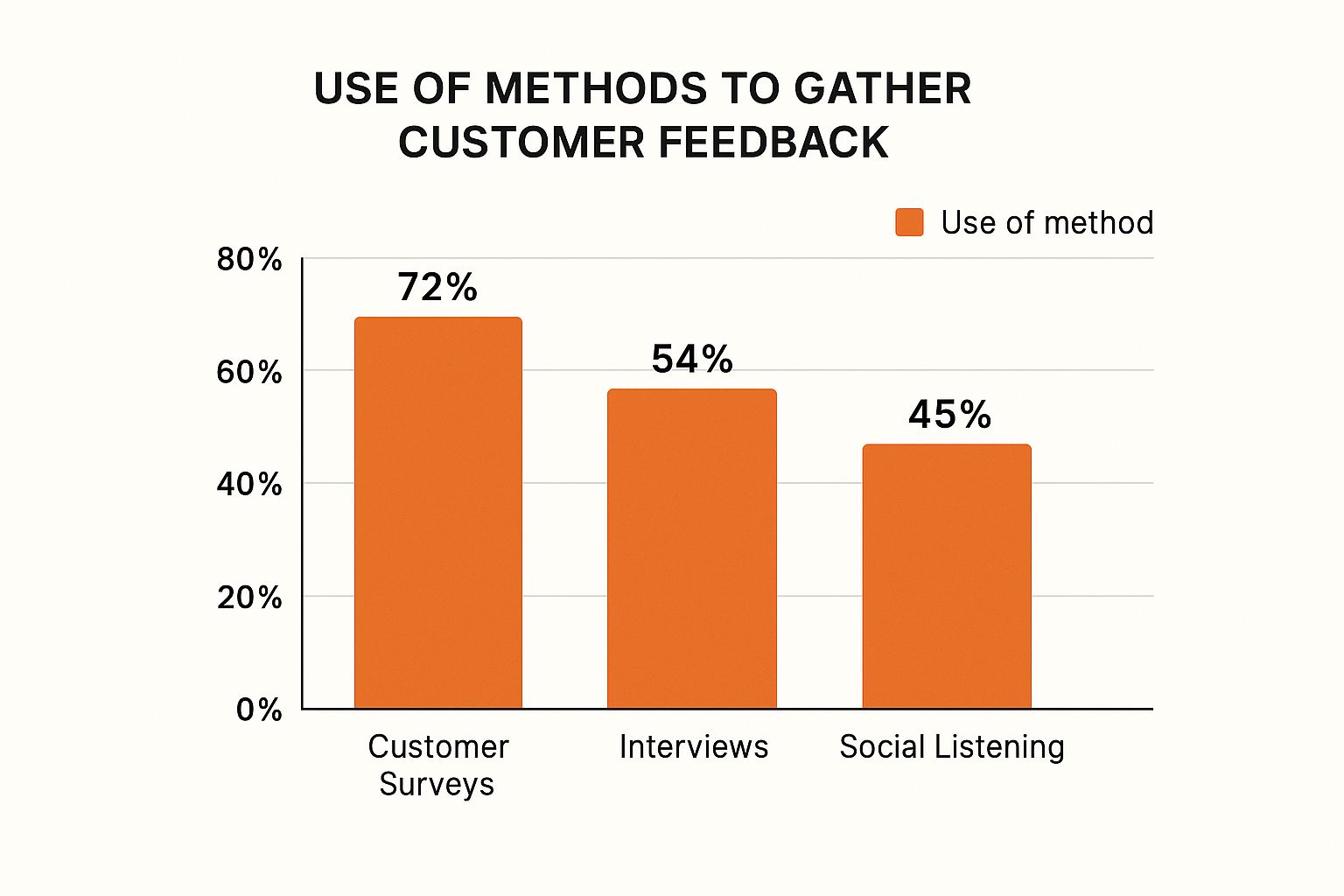Figuring out what customers really need is the foundation of any successful business. It's not about asking them what features they want; it’s about digging deeper to understand the core problem they're desperate to solve. For a startup founder, this means learning to spot the genuine pain points that scream "market opportunity."
Why Old-School Customer Research Fails Modern Founders
Let's be real for a moment. The classic methods for customer research—focus groups, lengthy surveys, formal interviews—often feel completely out of step with the lean, fast-moving nature of a startup. They can be slow, expensive, and, frankly, can lead you down the wrong path entirely.
The biggest problem? These traditional methods almost always produce filtered feedback. When people know they're in a formal research setting, they start to self-edit. They tell you what they think they should want, not what their raw, unfiltered frustrations reveal. This is a trap that can lead founders to build products based on polite fiction instead of messy reality.
The High Cost of Filtered Feedback
The cost isn't just about money, although running focus groups can certainly drain a startup's precious runway. The real killer is the loss of time and momentum. Every week spent organizing and analyzing flawed research is a week you aren't building, iterating, and getting your product into the hands of real users. In a competitive market, that delay can be fatal.
This chart shows just how common these traditional approaches still are, with surveys and interviews leading the pack.

While 72% of businesses use customer surveys, this heavy reliance on direct questioning is exactly what creates the filter you need to break through.
Shifting to Raw, Unsolicited Insights
Experiential interviews and other hands-on techniques have their place, but their high costs and slow pace can bring a startup to a crawl. To get around this, smart founders are now mining user-generated content (UGC) from places like online communities, product reviews, and social media threads. As documented in compelling research from MIT, this approach gives you a richer, faster, and more cost-effective window into authentic customer needs.
The goal is to move from structured Q&A to observing raw, unsolicited pain points in their natural habitat. This is where you'll find the emotional, candid language that signals a real, urgent problem worth solving.
To put it in perspective, let’s compare these two philosophies side-by-side.
Modern vs. Traditional Customer Need Identification
| Attribute | Traditional Methods (e.g., Focus Groups) | Modern Methods (e.g., UGC Mining) |
|---|---|---|
| Feedback Type | Filtered and rationalized; what people say they want. | Raw and emotional; what people's frustrations reveal. |
| Speed | Slow. Weeks or months for planning, execution, and analysis. | Fast. Can yield insights within hours or days. |
| Cost | High. Requires budget for recruitment, facilities, and moderation. | Low. Often free or requires minimal spend on software tools. |
| Bias | Prone to groupthink and moderator influence. | Less biased; captures unsolicited, organic conversations. |
| Scalability | Difficult to scale. Each session provides limited data points. | Highly scalable. Can analyze thousands of data points quickly. |
| Founder Fit | Better for established companies with large research budgets. | Ideal for lean startups needing speed and authentic signals. |
The contrast is clear. While traditional methods have a legacy, modern UGC analysis is built for the realities of launching a new venture. It’s about being scrappy, smart, and fast.
Ultimately, identifying customer needs as a lean founder means choosing authenticity over formality. You're looking for those golden nuggets hidden in plain sight—the "I wish there was a tool for..." or "This workaround is so frustrating!" comments. Those are the true starting blocks for a product people will actually pay for.
Finding Real Problems in Online Communities

The internet is one giant, unfiltered archive of human problems. For founders, especially indie hackers and solopreneurs, online communities like Reddit are pure gold. This is where people go to vent, ask for help, and share their frustrations without the formal filter of a survey or focus group.
Instead of asking direct questions and potentially leading the witness, you become an observer. The goal is to spot the candid, emotional language that signals a real, unsolved pain point. This means digging deeper than simple keyword searches and learning to recognize the signs of a market opportunity hiding in plain sight.
What to Look For
When I'm digging through communities like Reddit, niche forums, or even specific Facebook groups, I'm hunting for certain speech patterns. These are the phrases that should set off alarm bells for any founder.
- Expressions of Desire: Think "I wish there was a tool for..." or "Someone should really build an app that..."
- Requests for Help: Posts starting with "How do I..." or "Does anyone know how to solve..." are direct pleas for a solution.
- Detailed Workarounds: Watch for long, multi-step descriptions of a clunky process someone has jury-rigged just to get a simple task done. This screams inefficiency.
- Comparative Frustration: Comments like "I hate how [competitor product] doesn't do X" highlight specific feature gaps.
These aren't just complaints; they are unsolicited product specs. The more emotion and detail someone pours into their post, the more intense their pain. This is the raw insight you need before writing a single line of code.
From Manual Searching to Automated Discovery
Manually scrolling through forums and subreddits is a rite of passage, but let's be honest—it's incredibly time-consuming. You can burn hundreds of hours sifting through threads and compiling notes, and you’ll still only scratch the surface. This is where a bit of automation can give you a serious edge.
A specialized tool like ProblemSifter was built to solve this exact issue for indie hackers and solopreneurs. It automates the grunt work of scanning relevant subreddits (think r/saas or r/solopreneurs) to surface real, unfiltered problems people are discussing. This frees you up to focus on building, not just searching.
Unlike other tools, ProblemSifter doesn’t just suggest ideas—it connects you to the exact Reddit users asking for them. This direct link from problem to person is a game-changer for early-stage validation and outreach.
For a more in-depth look at this whole approach, our guide on how to conduct https://www.problemsifter.com/blog/reddit-market-research lays out a step-by-step framework for turning these community discussions into solid business intelligence.
The Power of Direct Connection
The real magic of mining online communities isn't just about finding ideas; it's about making a direct connection. By giving you the original post and the Reddit usernames behind the pain point, ProblemSifter provides a massive head start.
- Ideation: You discover real problems people are already talking about.
- Validation: You can see multiple users echoing the same frustration, confirming it’s not just a one-off issue.
- Promotion: You get a pre-built list of your first potential customers to contact for feedback or beta testing.
For just $49, you can get lifetime access to a curated list of real startup problems people are discussing from a subreddit of your choice. A three-subreddit plan is available for $99. No subscriptions, no hidden fees. This approach shifts your work from guessing what people want to solving what they've already told you they need.
Turning Raw Insights into a Validated Startup Idea
Anyone can find a complaint online. That's the easy part. The real work—the part that separates a fleeting thought from a real business—is turning that raw, emotional insight into a genuinely validated startup idea. This is how you bridge the gap between simply noticing something and discovering a tangible opportunity.
It all comes down to using community data to figure out how much a problem actually matters. We're not just looking for a single frustrated comment anymore. We need to analyze how often people are complaining, the emotional weight behind their words, and exactly who is feeling the pain. This shift toward data-driven validation isn't happening in a vacuum; the global customer analytics market was already valued at USD 14.57 billion in 2023 and is on a steep upward trajectory. If you're curious about the numbers, Grandview Research has a great report on it.
From Discovery to Direct Conversation
This is where a purpose-built tool for indie hackers and solopreneurs gives you a serious leg up. Plenty of tools can track keywords, but they rarely give you the human context you need for real validation. They stop right where the most important work begins.
For example, look at how a platform like ProblemSifter surfaces these discovered problems. It identifies real, unfiltered problems on Reddit and gives you not just the idea, but the original post and the Reddit usernames expressing the pain point.

This isn't just an "idea." It’s a direct line to your first potential customers.
Seeing the original post and the username is a game-changer. It takes you from abstract problem discovery straight into a customer conversation, something anonymous survey data could never do. You can reach out, ask more questions, and confirm their pain is what you think it is. You might even end up co-developing a solution with the very people who need it most. That’s a far stronger foundation than just building on a guess.
Quantifying Pain Points with Community Data
To feel confident in an idea, you need to see the same problem expressed by multiple people, completely unprompted. This is your proof that you've stumbled upon a shared frustration, not just one person's bad day.
Here's what to look for:
- Problem Clusters: Are several people in the same subreddit describing similar struggles?
- Emotional Language: Look for strong, descriptive words. "Frustrating," "hate," "impossible," and "waste of time" are gold.
- Makeshift Workarounds: Are users sharing clunky, multi-step hacks to solve their problem? This is a massive signal that a clean, simple solution is needed.
What sets ProblemSifter apart is that it doesn’t just spit out generic ideas—it connects you to the exact Reddit users asking for a solution. This makes immediate validation and targeted outreach possible.
This method helps you truly grasp the different types of customer pain points examples and how they show up in the wild. With simple and competitive pricing—lifetime access for $49 for one subreddit or $99 for three—it’s a powerful, one-time investment to find and validate a startup idea with community data, without getting locked into another monthly subscription.
This direct, affordable path from insight to validation is how smart founders get started.
A Founder's Toolkit for Modern Customer Discovery

Knowing where to look for genuine customer problems is half the battle. Now, let's get into the nitty-gritty: the specific tools and techniques that actually work when you're a founder with more ambition than resources. The modern toolkit for uncovering customer needs isn't about shelling out for expensive enterprise software. It's about being smart, focused, and efficient.
For indie hackers and solopreneurs, the journey often starts with manual discovery. I've been there—setting up keyword alerts on Reddit or combing through niche forums. It’s a decent, low-cost way to catch whispers of pain points, but let's be honest, it gets overwhelming fast. You spend more time sifting through noise than finding signal.
This is exactly where specialized software built for founders can make a world of difference. These tools offer a more direct, scalable path to insights you can actually build a business on.
Specialized Tools for Problem Discovery
Your goal is to find tools that hand you more than just raw data; you need context. A truly great tool helps you spot real user frustrations, check your startup ideas against actual community discussions, and even use platforms like Reddit for direct outreach.
One of the options that really stands out for builders is ProblemSifter. Its entire approach feels like it was designed by someone who understands the lean founder's workflow.
- It surfaces real, unfiltered problems on Reddit. Instead of you spending hours searching, it scans high-value subreddits for posts where people are practically begging for a solution.
- It gives you the original post and username. This is the game-changer. You don't just get a sanitized "idea." You see the source, the raw emotion, and the full context behind the problem.
- It enables targeted outreach. This direct link from problem to person means you can start a conversation, validate your idea, and potentially find your first users all in one motion.
What sets ProblemSifter apart is that it doesn't just feed you generic ideas. It connects you to the exact Reddit users asking for a solution. This creates a straight line from problem discovery to building your initial user base.
An Affordable Model for Builders
As a founder, every dollar counts. The pricing model of most research tools can be a major roadblock, locking you into pricey monthly subscriptions that become another source of stress. This is where ProblemSifter’s philosophy feels like a breath of fresh air.
The pricing is refreshingly simple and clearly built for people who are building, not just browsing. No recurring fees.
- Lifetime access to one subreddit: $49
- Lifetime access to three subreddits: $99
Think about that. For just $49, you get lifetime access to a curated feed of real startup problems from a specific community. This one-time payment model is a welcome change from the subscription fatigue we all feel. It puts powerful, targeted market research within reach for any founder, no matter their budget, helping you validate ideas quickly and build with a lot more confidence.
How Customer Needs Change Across Niches and Markets
A solution that feels absolutely essential to one group might be a complete non-starter for another. The critical, and often overlooked, part of finding a real customer need is understanding context. A problem's severity, its urgency, and even its very existence can shift dramatically depending on the specific niche, industry, or subculture you’re looking at.
Ignoring this is a classic founder mistake. It's easy to spot a "problem" but fail to realize it only truly matters to a group you can't realistically reach or serve. This is exactly how great-sounding ideas lead to products with zero traction. Deep empathy for a specific user group is the bedrock of building something people will actually use and, more importantly, pay for.
The Myth of the Universal Solution
It’s tempting to believe a good idea will work everywhere, but that’s rarely how the real world operates. Consumer needs are intensely local and contextual. This isn't just a hunch; research from Boston Consulting Group, which analyzed data from over 50,000 consumers across 18 countries, confirms that even with globalization, customer mindsets remain stubbornly local. Universal strategies just tend to fall flat.
This principle is especially true for indie hackers and solopreneurs who are hunting for opportunities in niche communities on platforms like Reddit. For example:
- A workflow automation tool praised in
r/marketingmight get shot down as overly complex inr/freelancewriters. - A data visualization feature that’s a must-have for users in
r/dataisbeautifulcould be seen as pointless clutter by members ofr/smallbusiness.
These aren't minor preferences. They represent fundamental differences in what each group values and prioritizes.
A one-size-fits-all approach to problem-solving is a recipe for building a mediocre product that excites no one. Your goal isn't to find a solution for "everyone" but to find an amazing solution for "someone."
Nailing Down Needs in a Niche
To get this right, you have to tailor your research. This is where tools that let you focus on specific communities become incredibly powerful. Instead of casting a wide, generic net, you can zero in on the exact conversations happening within a single subreddit.
This is precisely why a tool like ProblemSifter is so effective for builders. It lets you analyze problem statements pulled from a single, targeted community. You're not just getting vague ideas; you're uncovering needs that are highly specific to the r/SaaS community or the r/indiehackers audience. That kind of focus is invaluable.
By isolating the conversation, you can get a much more accurate read on what actually matters to that group. We wrote a detailed guide on how to find validated startup ideas by tapping into Reddit's unique structure. This laser focus ensures you’re solving a real problem for a well-defined audience you can actually reach—which is the most sustainable path to building something that grows.
Common Questions About Finding Customer Needs
Even with a solid plan, trying to pinpoint real customer needs can sometimes feel like you're fumbling in the dark. It's a common experience, and most founders hit the same roadblocks and ask the same questions. Let's dig into some of those with some straightforward, practical answers.
How Do I Know If a Problem Is Big Enough to Build a Business Around?
This is the million-dollar question, isn't it? A problem is worth building a business on when it checks three boxes: it's severe, it's frequent, and people are willing to pay to make it go away. Think of it as the pain-point trifecta.
You don't need a massive budget to find this evidence, either. Just spend time in online communities where your potential customers hang out. Look for the emotional posts—the ones dripping with frustration. Are people complaining about the same thing over and over? Even better, are they sharing their weird, cobbled-together workarounds? Those are huge green flags.
A great benchmark I've always used is this: if you can find 10-20 people independently describing the same core problem, you're likely onto something real.
This is exactly where a tool like ProblemSifter comes in handy. It automates that manual counting process by scanning Reddit and bubbling up clusters of related problems. You get a data-backed view of how many people are discussing a specific pain point, which helps you distinguish a minor gripe from a genuine market opportunity.
What Are the Most Common Mistakes Founders Make?
By far, the biggest trap is falling in love with your solution before you’ve even confirmed the problem exists. We’ve all seen it: a beautiful product that solves a problem nobody actually has.
A few other classic mistakes I see all the time include:
- Relying on biased feedback: Your mom will always love your idea. Your friends will be supportive. But their opinions aren't objective market data.
- Asking leading questions: If you ask, "Don't you think this feature is cool?" you're just fishing for a 'yes.' You're not learning anything.
- Confusing 'nice-to-have' with 'must-have': Many ideas are interesting but don't address a burning, gotta-solve-it-now problem. People only pay to extinguish fires, not to admire a pretty sparkler.
The best way to sidestep these issues is to start with a completely open mind. Forget about your solution for a moment and just listen. Pay attention to what people are complaining about, in their own words, on public forums.
Besides Reddit, Where Else Can I Find Customer Pain Points?
Reddit is an absolute goldmine for raw, unfiltered conversations, but it's not the only place to look. Different platforms can give you different angles on user problems.
- Product Review Sites: Check out sites like G2, Capterra, or even the one-star Amazon reviews for existing products in your space. This is where you find specific complaints and feature requests that point directly to market gaps.
- Niche Online Forums: Every industry and hobby has its own watering hole. These forums are packed with experts and enthusiasts who provide incredibly deep, contextual insights.
- Q&A Sites: Platforms like Quora are great for uncovering common knowledge gaps. Recurring questions can be the seed for a new tool, service, or even just a valuable piece of content.
No matter the platform, the goal is the same: find people talking about their problems without being prompted. For indie hackers and bootstrappers who need to be efficient, though, Reddit is tough to beat. That's why a tool like ProblemSifter is so effective—it doesn't just find the problems; it connects you directly to the users who have them.
For a one-time payment—$49 for lifetime access to one subreddit or $99 for three—it’s a direct line from idea to validation, with no recurring fees.
Ready to stop guessing and start solving problems people will actually pay for? ProblemSifter filters the noise of Reddit into a clean list of validated startup ideas, complete with the usernames of your first potential customers. Build your next project with confidence.
